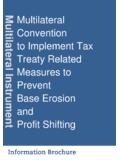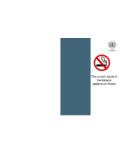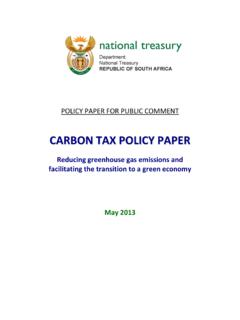Transcription of Convention Signed at Washington July 1, 1957; …
1 TAXATION Convention WITH PAKISTANC onvention Signed at Washington July 1, 1957; Ratification Advised by the Senate of the United States of America,With a Reservation, July 9, 1958;Ratified by the President of the United States of America, Subject to Said Reservation,November 6, 1958;Ratified by Pakistan May 2, 1959;Ratifications Exchanged at Karachi May 21, 1959;Proclaimed by the President of the United States of America May 28, 1959;Entered into Force May 21, 1959 GENERAL EFFECTIVE DATE UNDER ARTICLE XX: 1 JANUARY 1959 TABLE OF ARTICLESA rticle I----------------------------------Taxes CoveredArticle II---------------------------------Gener al DefinitionsArticle III--------------------------------Perma nent EstablishmentArticle IV--------------------------------Associ ated EnterprisesArticle V---------------------------------Shippi ng and Aircraft IncomeArticle VI--------------------------------Divide ndsArticle VII-------------------------------Exempt ion of DividendsArticle VIII------------------------------Royalt iesArticle IX--------------------------------Govern ment EmployeesArticle X---------------------------------Pensio ns and AnnuitiesArticle XI--------------------------------Person al ServicesArticle XII-------------------------------Profes sors or TeachersArticle XIII------------------------------Studen ts or TraineesArticle XIV------------------------------Governm ent BanksArticle
2 XV-------------------------------Avoidan ce of Double TaxationArticle XVI------------------------------Mutual AssistanceArticle XVII-----------------------------Limitat ions on Effect of TreatyArticle XVIII----------------------------Territo rial ExtensionArticle XIX------------------------------Entry into ForceArticle XX-------------------------------Termina tionLetter of Submittal----------------------of 8 July, 1957 Letter of Transmittal--------------------of 12 July, 1957 Protocol of Exchange-------------------of 21 May, 1959 MESSAGEFROMTHE PRESIDENT OF THE UNITED STATESTRANSMITTINGA Convention BETWEEN THE UNITED STATES OF AMERICA AND PAKISTANFOR THE AVOIDANCE OF DOUBLE TAXATION AND THEPREVENTION OF FISCAL EVASION WITH RESPECT TO TAXES ON INCOME, Signed AT Washington ON JULY 1, 1957 LETTER OF SUBMITTALDEPARTMENT OP STATE, Washington , July 8, PRESIDENT,The White House: The undersigned, the Secretary of State, has the honor to submit to the President, with a viewto its transmission to the Senate to receive the advice and consent of that body to ratification, ifthe President approve thereof, a Convention between the United States of America and Pakistanfor the avoidance of double taxation and the prevention of fiscal evasion with respect to taxes onincome, Signed at Washington on July 1, 1957.
3 The Convention was formulated as a result of technical discussions between representativesof this Government and representatives of the Pakistan Government, in the course of which aneffort was made to determine the bases upon which agreement might be reached for the purposeof avoiding double taxation, and establishing certain procedures for mutual administrativeassistance, in regard to income taxation. Elimination of such double taxation is an important steptoward removing one of the impediments to international trade and investment. The Convention with Pakistan follows in general the pattern of income-tax conventionspresently in force between the United States and a number of foreign countries, namely,Australia, Belgium, Canada, Denmark, Finland, France, the Federal Republic of Germany,Greece, Honduras, Ireland, Italy, Japan, the Netherlands, New Zealand, Norway, Sweden,Switzerland, the Union of South Africa, and the United Kingdom.
4 As in the cases of similar conventions, the one with Pakistan is designed to eliminateobstacles to the international flow of trade and investment. It contains provisions relating tobusiness income, investment income, personal service (including professional) income, officialsalaries, pensions and annuities, remuneration received by teachers, remittances or grants tostudents and apprentices, and interest received by the State Bank of Pakistan and the FederalReserve banks of the United States from sources in the other country. The Convention alsocontains, as is customary, provisions regarding administrative procedures, including exchange ofinformation, for giving effect to the Convention . The Convention contains certain provisions, unlike those in income-tax conventions withother countries, under which the United State would take an important step toward avoidingnullification of the efforts of a foreign country to encourage industrial development through itstax law.
5 Pakistan tax law, in order to attract capital and encourage investment for thedevelopment of Pakistan's economy and natural resources, offers an incentive for establishmentof approved new enterprises. Pakistan accords certain tax exemptions as to profits of suchenterprises and also as to dividends paid out of such profits. More specifically, under the income-tax law of Pakistan a business qualifying as a new enterprise may obtain tax exemption for a 5-year period on profits up to 5 percent of invested capital, and dividends paid from such profitsmay be tax exempt. At present an American corporation qualifying for such treatment underPakistan law may find that United States taxes will be increased and thus offset the effects of thePakistan tax law. The concession by Pakistan, therefore, is no special attraction to the UnitedStates investor. Under article XV (1) of the proposed Convention this situation would beremedied within limits and on certain conditions by treating, as though paid for foreign-tax-creditpurposes, the amount of income tax and supertax by which the American taxpayer's Pakistan taxis reduced.
6 It is understood that the Department of the Treasury is prepared to make such furtherexplanations as may be found desirable regarding the technical aspects and application of theproposed Convention . The Convention applies, so far as United States taxes are concerned, only to the Federalincome taxes, including surtaxes. It does not apply to the imposition or collection of taxes by theseveral States, the District of Columbia, or the Territories or possessions of the United States,although it contains a broad national-treatment provision similar to a provision customarilyfound in treaties of friendship, commerce, and navigation. In Pakistan the Convention would beapplicable to the income tax, super-tax, and business-profits tax. It is believed that the Convention with Pakistan, if brought into force, would be beneficial toboth countries and to their respective citizens and enterprises.
7 It has the approval of theDepartment of State and the Department of the Treasury. Article XIX provides for ratification and for exchange of instruments of ratification. Itprescribes that, upon such exchange, the Convention shall have effect in the United States fortaxable years beginning on or after January 1 of the year in which the exchange takes place andshall have effect in Pakistan for "previous years" or "chargeable accounting periods," as definedin Pakistan law, beginning on or after January 1 of the year in which the exchange takes place. It is provided in Article XX that the Convention shall continue in effect indefinitely, but maybe terminated at the end of a period of 3 years or thereafter by the giving of a notice by one ofthe parties to the other party on or before June 30 of any year, in which event the conventionwould cease to be effective (a) in the United States, for the taxable years beginning on or afterJanuary 1 next following the notice of termination, and (b) in Pakistan, in respect of the"previous years" or the "chargeable accounting periods," as defined in Pakistan law, beginningon or after January 1 next following the notice of termination.
8 Respectfully submitted,JOHN FOSTER DULLES. (Enclosure: Income-tax Convention with Pakistan.)LETTER OF TRANSMITTALTHE WHITE HOUSE,July 12, the Senate of the United States: With a view to receiving the advice and consent of the Senate to ratification, I transmitherewith a Convention between the United States of America and Pakistan for the avoidance ofdouble taxation and the prevention of fiscal evasion with respect to taxes on income, Signed atWashington on July 1, 1957. I transmit also for the information of the Senate the report by the Secretary of State withrespect to the proposed Convention . The Convention has the approval of the Department of State and the Department of D. EISENHOWER.(Enclosures: (1) Report by the Secretary of State; (2) income-tax Convention with Pakistan.)BY THE PRESIDENT OF THE UNITED STATES OF AMERICAA PROCLAMATION WHEREAS a Convention between the United States of America and Pakistan for theavoidance of double taxation and the prevention of fiscal evasion with respect to taxes on incomewas Signed at Washington on July 1, 1957 by their respective Plenipotentiaries, the original ofwhich Convention is word for word as follows: The Government of the United States of America and the Government of Pakistan, desiringto conclude a Convention for the avoidance of double taxation and the prevention of fiscalevasion with respect to taxes on income, have appointed for that purpose as their respectivePlenipotentiaries: The Government of the United States of America:John Foster Dulles, Secretary of State of the United States of America, and The Government of Pakistan.
9 Mohammed Ali, Ambassador Extraordinary and Plenipotentiary of Pakistan to theUnited States of America, andSyed Amjad Ali, Minister of Finance of Pakistan,who, having communicated to one another their full powers, found in good and due form, haveagreed as follows:ARTICLE I(Taxes Covered) (1) The taxes which are the subject of the present Convention are:(a) In the United States of America:The Federal income taxes, including surtaxes (hereinafter referred to as United Statestax).(b) In Pakistan:The income tax, super-tax and the business profits tax (hereinafter referred to as Pakistantax). (2) The present Convention shall also apply to any other taxes of a substantially similarcharacter (including excess profits tax) imposed by either contracting State after the date ofsignature of the present Convention , or by the Government of any territory to which the presentConvention is extended under Article II(General Definitions) (1) In the present Convention , unless the context otherwise requires:(a) The term "United States" means the United States of America and when usedin a geographical sense means the States thereof, the Territories of Alaska and Hawaiiand the District of Columbia;(b) The term "Pakistan" means the Provinces of Pakistan and the Capital of theFederation;(c) The terms "one of the contracting States" and "the other contracting State"mean the United States or Pakistan, as the context requires.
10 (d) The term "tax" means United States tax, or Pakistan tax, as the contextrequires;(e) The term "person" includes any body of persons, corporate or not corporate;(f) The term "company" means any body corporate or not corporate, assessed as acompany under Pakistan law relating to Pakistan tax;(g) The term "United States corporation" means a corporation, association orother like entity created or organized in the United States or under the law of the UnitedStates or of any State or Territory of the United States;(h) The term "resident of the United States" means any individual or fiduciarywho is resident in the United States for the purposes of the United States tax, and notresident in Pakistan for the purposes of the Pakistan tax, and any United Statescorporation or any partnership created or organized in the United States or under the lawsof the United States, being a corporation or partnership which is not resident in Pakistanfor the purposes of Pakistan tax;(i) The term "resident of Pakistan" means any person (other than a citizen of theUnited States or a United States corporation) who is a resident in Pakistan for thepurposes of Pakistan tax and not resident in the United Slates for the purposes of theUnited States tax.















